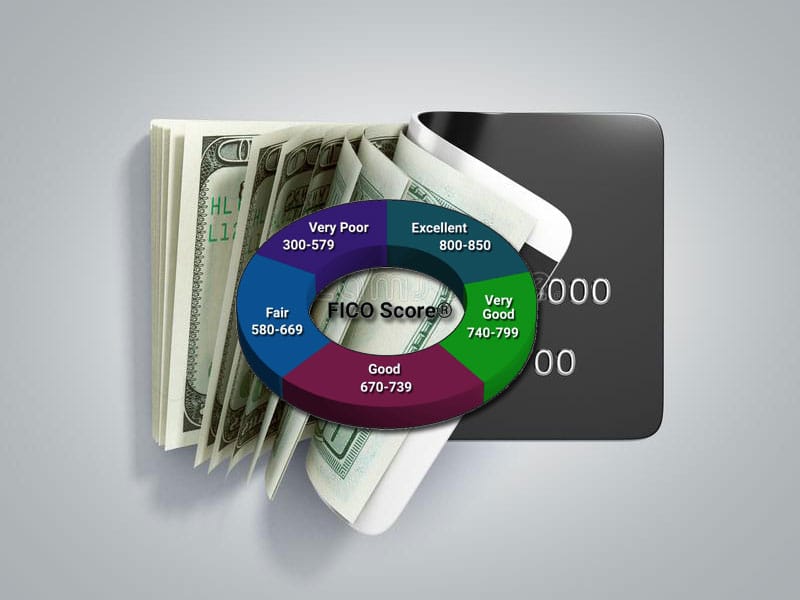
A FICO score is a three-digit number that lenders use to assess your creditworthiness. The score is based on information from your credit report, and it ranges from 300 to 850. A higher score indicates that you’re a lower-risk borrower, which means you’re more likely to qualify for a loan with favorable terms.
A lower score indicates that you’re a higher-risk borrower, which means you may have to pay a higher interest rate or may not qualify for a loan at all.
FICO scores are the most widely used credit scores, so it’s important to understand how they work. Luckily, there are a few simple things you can do to improve your score.

Table of Contents
1. Consider Financing Your Next Vehicle
Your FICO score is a key factor in determining the interest rate you’ll pay on a loan, so it’s important to keep it as high as possible. One way to do this is to diversify your credit types. Having both revolving credit (such as credit cards) and installment loans (such as car loans) can help improve your score.
And, there are options for auto loans for bad credit. So if you’re worried about your ability to finance a car you’ll love, rest assured that there are financing options for people from all walks of life.
2. Check Your Credit Report for Errors
One simple way to give your score a boost is to check your credit report for errors and dispute any inaccuracies that you find. Credit reporting agencies are required by law to investigate disputes, and if they determine that an error has been made, they will correct it.
This process can take a while, but it’s worth the effort if it means an improvement in your FICO score.
3. Make Your Payments on Time
One of the biggest factors that influence your FICO score is your payment history. A simple way to start boosting your credit score is to make your payments on time. This includes both big bills like your mortgage or car payment, as well as smaller ones like your credit card bill.
By showing that you’re reliable and able to meet your financial obligations, you can give lenders confidence that you’re a good borrower. Additionally, paying your bills on time can help you avoid late fees and other penalties that can further damage your credit score.
4. Lower Your Credit Card Balances
Credit card companies report your balance to the credit bureaus every month. The lower your balances are, the better it will look on your report. Creditors like to see that you’re using less than 30% of your available credit limits because it indicates that you’re a low-risk borrower.
This is because creditors view high balances as a sign of financial risk. Of course, you don’t want to cancel your cards or stop using them altogether, as that can also damage your score. But keeping your balances low is a simple way to give your credit score a boost.
5. Be Strategic about Applying for New Lines of Credit
One common piece of advice is to only apply for lines of credit when absolutely necessary. This is because each time you apply for a new credit card or loan, the lender will do a hard inquiry on your credit report, which can temporarily lower your score.
So if you’re not planning on using the credit line right away, it might be best to wait.
6. Keep Your Oldest Account Open and Use it Responsibly
Having a long credit history is one of the factors that go into your credit score—so if you’re trying to improve your credit, it’s worth keeping your oldest account open. That said, simply having an old account isn’t enough.
You also need to use that line of credit regularly so that it doesn’t become dormant. Just make sure you use it responsibly and pay off the balance on time.
7. Get Rid of Any Unused or Dormant Accounts
On the other hand, depending on your individual credit mix, it may improve your FICO score to get rid of any unused or dormant accounts. This includes closing any accounts that you no longer use, such as old credit cards or store cards.
Having too many unused accounts can lower your score, so it’s important to close any that you don’t need if you have a lot open.
8. Use a Credit Monitoring Service
Credit monitoring services can help you keep track of your FICO score and identify any factors that are impacting it. Additionally, many credit monitoring services offer tools and resources that can help you improve your score.
Some services will send you alerts if there’s a change in your score, which can help you identify any potential issues early on.
There are also many credit monitoring services that offer educational resources that can teach you about the factors that influence your score and how to improve it. You’ll receive advice to improve your current score, as well as education on how to keep your score high in the future.
9. Make a Plan to Lower Your Overall Debt without Balance Transfers
If you’re trying to improve your credit score, you might be considering a balance transfer. After all, getting out of debt is an important part of boosting your credit score. However, balance transfers can actually do more harm than good. Here’s why: When you transfer a balance, you’re generally required to pay a fee.
This fee can be anywhere from 3% to 5% of the balance being transferred. So, if you’re transferring a $5,000 balance, you could be paying $250 in fees. That’s money that could be going toward paying down your debt.
Additionally, balance transfers often come with a higher interest rate than your current card. So, even though you’re not paying interest on the debt for a period of time, you could end up paying more in interest overall.
If you’re carrying a balance on your new card after the intro period expires, your credit utilization will go up, which could hurt your credit score. For these reasons, it’s generally best to avoid balance transfers if you’re trying to improve your credit score. Instead, focus on creating a plan to pay down your debt as quickly as possible.
By doing so, you’ll save money and give yourself the best chance of boosting your credit score.
10. Don’t Open Multiple Accounts at One Time
One of the biggest myths about credit scores is that you can improve your score by opening multiple accounts at one time. While it’s true that adding new credit can help to boost your score, it’s also important to understand that opening multiple accounts can actually hurt your score in the long run.
That’s because each time you apply for credit, the lender will do a hard inquiry on your credit report. This can have a negative impact on your score, especially if you have a limited credit history.
By following these 10 tips, you can improve your FICO score over time and make yourself more attractive to potential creditors when you apply for loans and credit products in the future.





